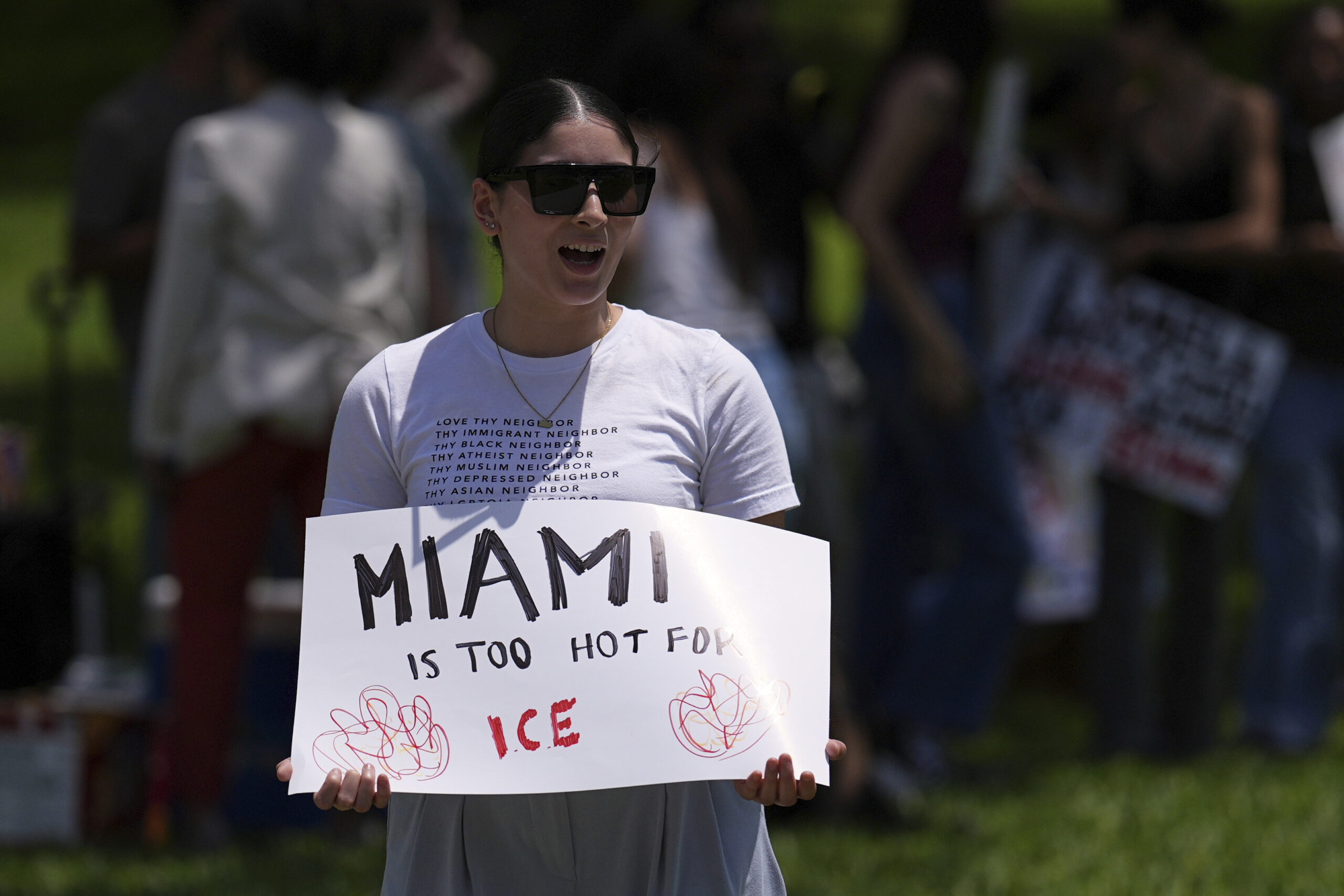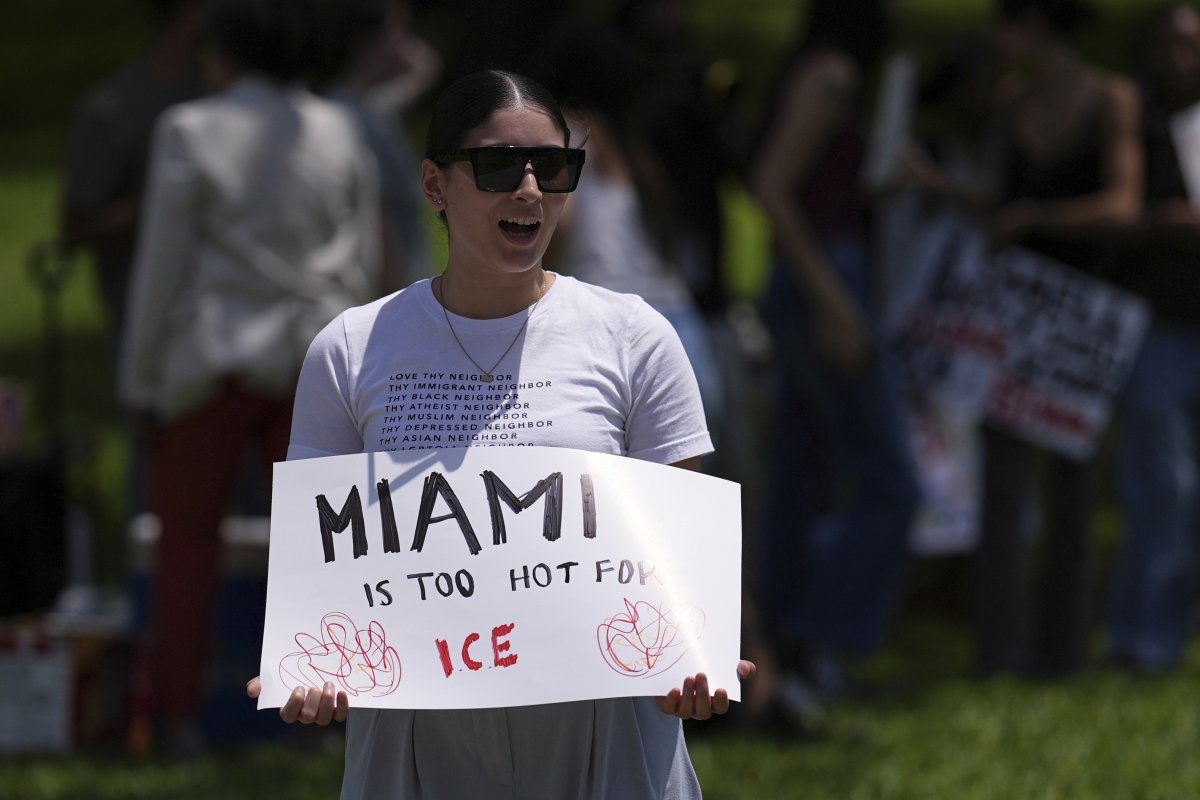
Florida’s police and sheriff’s departments are joining up with federal immigration enforcement operations this week, with a target to arrest around 800 illegal immigrants.
The Immigration and Customs Enforcement (ICE) operation, stretching from Jacksonville to Miami, got underway Monday, according to a briefing seen by the Miami Herald.
“It’s shameful that something as sensitive as immigration enforcement has been turned into this type of whack-a-mole carnival game where human beings are the targets,” the Florida Immigrant Coalition (FLIC) told Newsweek.
“Pushing and rushing local law enforcement agents, many untrained in the intricacies and complexities of immigration law, is a recipe for disaster. One can expect to see violations of civil rights, racial profiling, and botched enforcement that has the potential of netting people who are in the country with status and those who have no criminal record.”
Newsweek reached out to ICE for comment via email Thursday morning.
Why It Matters
So-called Operation Tidal Wave is one of the largest coordinated efforts between the Department of Homeland Security (DHS) and local law enforcement since President Donald Trump’s return to office with a promise to do just this, to enable his mass deportation plan. Florida, a state with a large immigrant population, was the first state to officially sign up.
What To Know
The operation got underway on Monday, with targets for arrest in Miami-Dade and Broward counties, as well as in the state capital, Tallahassee, and other cities including Tampa, Orlando, Jacksonville, Stuart, and Fort Myers, according to the Herald.
Miami, in particular, has a large immigrant population, with a proportion living there without legal status.
It was not immediately clear how many immigrants had been arrested during the first three days of the week-long operation, but it was expected that those with criminal charges or convictions would be the targets, along with suspected immigration law violators.

AP Photo/Rebecca Blackwell
There have been reports in recent weeks of immigrants turning up for regular check-ins with ICE and being detained, while raids have also taken place. The use of local law enforcement, under 287(g) powers, marks a shift in DHS’s efforts to detain illegal immigrants the administration wants to deport.
Around 130 Florida agencies are currently active under the program, which enables them to question, arrest, and detain those suspected of being undocumented immigrants. Those powers have long been held by federal agencies, such as ICE.
More applications are pending, with the Miami City Council debating joining at a meeting Thursday. In Homestead, a city southwest of Miami, officials voted to join despite 40 percent of its population being foreign-born, and 68 percent Hispanic.
FLIC and other groups have raised concerns that deputizing local and state agencies distracts them from other public safety duties, and that detaining immigrants with no criminal record adds to worker shortages and supply chain disruptions.
Operation Tidal Wave also comes amid tension between a federal judge and the Florida legislature over a new state law allowing the arrest of illegal immigrants.
Despite an April 4 order blocking arrests, it was reported that as many as 15 had been made by the end of last week. Florida Attorney General James Uthmeier said Wednesday that he could not prevent local law enforcement from enforcing the new law.
What People Are Saying
Florida Immigration Coalition, in its statement to Newsweek: “This is a rush to meet an arbitrary number, but behind those numbers are fathers, mothers, siblings, friends, and neighbors; hard-working members of our communities who pay taxes and contribute to our state.”
Florida Governor Ron DeSantis, on X, formerly Twitter: “The mission continues. Immigration law must be enforced and FL is leading on working with the Trump administration to get it done.”
Democratic National Committee member Juan Cuba, speaking against Doral joining 287(g) on April 17: “I think this is very dangerous, for a city like Doral that has so many families of mixed status, so many families that have protection currently, who came through TPS or humanitarian parole, or are applying for asylum, who are living in fear that might be stripped.”
What Happens Next
More local police and sheriff’s departments are expected to join the 287(g) program across the country, while some pushback continues in the courts and council meetings as immigration advocates raise concerns over the safety of undocumented immigrants who have committed no crimes.





